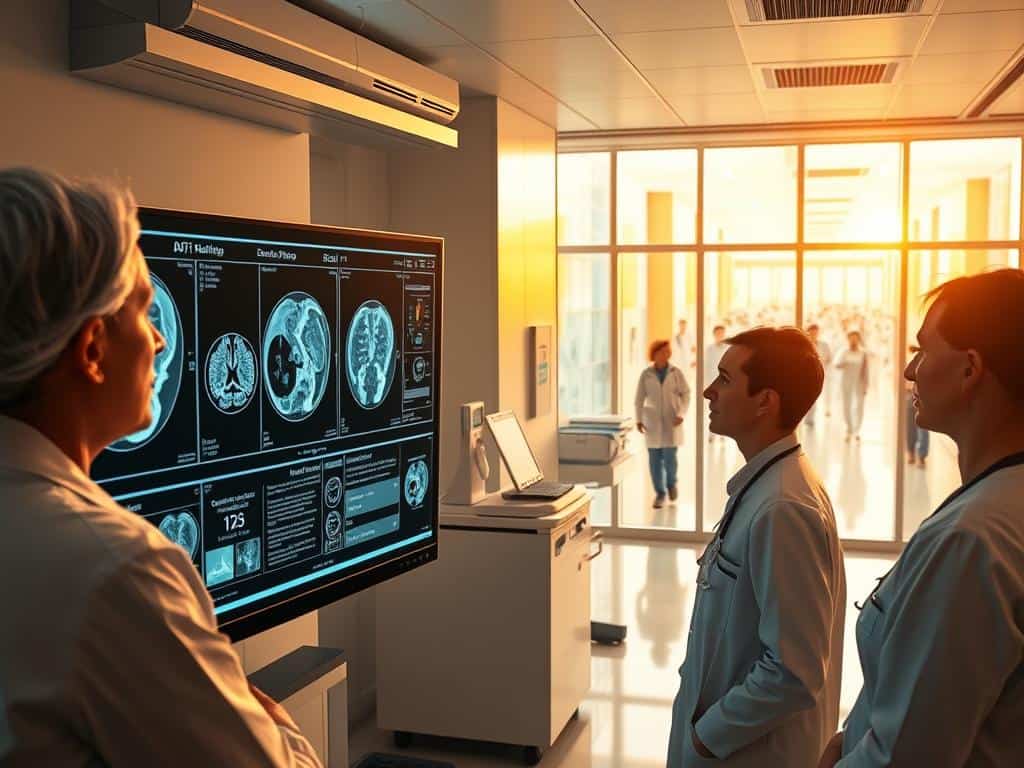Did you know that 1 in 2 healthy women are incorrectly told they have cancer due to false results from mammograms? This shows how urgent we need better diagnostics. AI in healthcare is making a big difference here. It’s changing medicine in ways we never thought possible.
AI is making doctors more accurate in finding diseases. It’s also making patient care better and making things run smoother. For example, AI can look at mammograms 30 times faster than before, with 99% accuracy. This shows how AI is changing medicine for the better.
AI is also helping doctors find diseases early, like heart disease, through wearables and devices. This could save a lot of lives. But, we need to watch out for the downsides, like biases and unfairness in AI.
Key Takeaways
- AI can improve diagnostic accuracy in healthcare.
- Artificial intelligence streamlines patient engagement and operational processes.
- AI technologies enhance early disease detection capabilities.
- The integration of AI can lead to cost-effective healthcare solutions.
- The ethical implications of AI must be carefully considered.
- AI-driven analytics can significantly aid clinical decision-making.
The Impact of AI in Healthcare
Artificial Intelligence is changing healthcare in big ways. It’s making diagnostics better and making healthcare administration smoother. This technology has a lot of promise for improving how we diagnose and manage health.
Revolutionizing Diagnostics
AI is making a huge difference in how we diagnose diseases. Arterys, founded in 2017, was the first to get FDA approval for AI in healthcare. This opened the door for faster and more accurate image analysis.
AI can now analyze cardiac images in seconds. It’s also very good at spotting genetic changes in cancer. AI can even find early signs of Alzheimer’s and diabetic retinopathy.
Enhancing Patient Engagement
AI is key in improving how patients and doctors interact. AI chatbots offer constant support and help patients stick to their treatment plans. This leads to better health outcomes and more personalized care.
AI also helps doctors predict and prevent health problems. This proactive approach is a game-changer in patient care.
Improving Efficiency in Healthcare Administration
AI is making healthcare administration more efficient. Nurses spend a lot of time on paperwork, but AI can automate these tasks. This frees up time for more important patient care.
AI can also cut costs and improve workflow. It helps reduce the chance of medical mistakes. This makes healthcare more efficient and effective.

AI in Healthcare: Transformative Surgical Techniques
AI is changing how we do surgery. Robotic surgery is a big step forward. It offers precision that old methods can’t match.
These AI systems help surgeons by making their work more consistent. This leads to better results and fewer mistakes in complex surgeries.
Robotic Surgery Advancements
Robotic surgery is making big changes in surgery. It uses smart algorithms and real-time data for better precision. This means less invasive procedures and quicker recovery times for patients.
An AI system can look at a patient’s medical history. It finds the safest places for surgery and suggests the best approach. This leads to less pain and shorter hospital stays.
Robotic surgery also makes healthcare more accessible. It helps when there’s a shortage of doctors. This is important for everyone to get the care they need.
Potential Ethical Concerns
But, there are ethical worries with robotic surgery and AI in surgery. We need to think about who’s responsible when mistakes happen. Patients should know how AI is used in their care.
There’s also a worry about fairness in healthcare. Not everyone might have access to these advanced surgeries. It’s important to use technology wisely and keep ethics in mind as robotic surgery grows.
Conclusion
Looking back, AI in healthcare has shown great promise. It boosts diagnostic accuracy and makes healthcare more efficient. AI is making a big difference in treating diseases like cancer and heart conditions.
More healthcare data and advanced analytics are driving this progress. This means we’re moving towards a future where healthcare is more precise and timely.
But, there are also challenges ahead, mainly about ethics. It’s important to remember that empathy and care are key in healthcare. AI can help reduce mistakes and send timely alerts, but we must balance technology with human values.
We need to talk about how to use AI in a way that respects patient needs and values. This is essential for the future of healthcare.
As we move forward with AI in healthcare, I hope we use it wisely. We should focus on both its efficiency and its ability to care for patients. The future of medicine depends on balancing technology with ethics.



